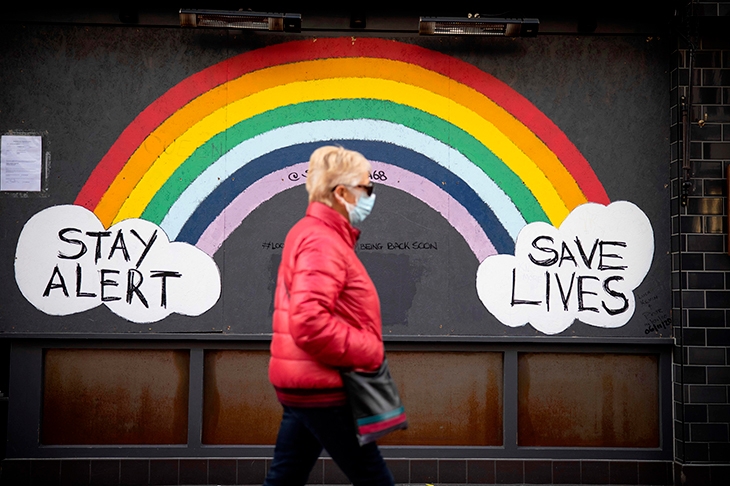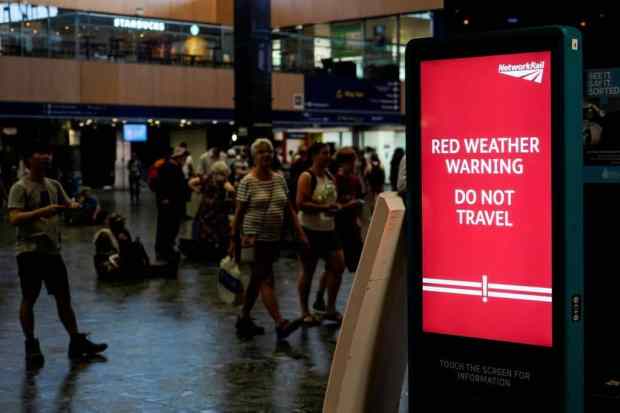Over the past week, the country has started to spring back to life. Trains and buses are no longer running empty. Bars and restaurants have put out signs proclaiming they are fully booked. Pubs are using school playgrounds as beer gardens and filling every seat. In Soho, people danced in the streets when someone walked through with a stereo. A country that has been locked down for months is finally coming back into the open, with not a penny of government bribery required.
There is a palpable sense of both relief and accomplishment. Yet the recent noises from No. 10 have been far from positive. The Prime Minister has claimed, oddly, that the decline in Covid cases has almost everything to do with lockdown and very little to do with vaccination. He has also insisted that reopening society will inevitably result in more illness and death.
Perspective is needed: our approach to the pandemic has always been about the balance of risk. When Britain fully emerges from lockdown in June, there will be an increase in Covid infections. But these infections should lead to far fewer deaths, due to the extraordinary success of the vaccination programme. Almost every member of an at-risk demographic has now been offered a jab. Recent studies show antibodies present in around 55 per cent of the country and 85 per cent of pensioners. The vaccines are working.
As has been the case all through this crisis, the public is several steps ahead of the government. Just as people voluntarily sent themselves into lockdown a year ago, ahead of official orders to do so, they have now decided that it is time to start to reclaim their lives. There will certainly be no need for an ‘eat out to help out’ scheme this time around, with some venues reporting full bookings for weeks ahead. This is not reckless: people are now quite well-versed in reading the Covid data. It shows infections are now 96 per cent lower than their peak with no surge after schools reopened.
According to the National Institute of Economic and Social Research, employment expanded in February, in spite of no restrictions having been lifted. In the same month manufacturing output managed to climb by 1.3 per cent and the service sector by 0.2 per cent, in spite of virtually all hospitality and non-essential retail being closed.
Good news ought not to be ignored by a government that seems determined to peddle gloom. The last date on the ‘roadmap to freedom’ is 21 June. That means two more months of restrictions — even though there is no longer a Covid emergency. This ultra-cautious approach has its logic. But it is odd for a Tory government that insists it cherishes liberty to be on the verge of creating a biosecurity state, with social distancing, vaccine passports and lateral flow testing potentially becoming mandatory parts of everyday life. There is no clear evidence, however, that these measures are worth the money.
The recent scandal about David Cameron lobbying the government to bail out Greensill Capital, the now-collapsed lending firm, points to more trouble ahead. Ministers will, even now, be granting expensive contracts to firms involved in Covid passports or lateral flow testing. How much taxpayers’ money is involved? And who might benefit financially?
A study from Bristol University shows that, if the vaccination campaign continues as advertised, then all restrictions can be lifted in June, even with a small new wave of infections. There is no need for expensive apparatus that would discriminate against those unwilling to carry identity cards. The implosion of the Labour party means the government does not currently face much scrutiny when big decisions are made. But as we are finding out — with leaked text messages and scandals over PPE procurement — the scrutiny certainly comes later.
If a variant emerges that genuinely evades the vaccines, that could dramatically set back the recovery. But again, perspective is needed. The South African variant caused a lot of anxiety at the beginning of the year about its potential to sidestep vaccines. But that has not stopped new cases in South Africa falling 95 per cent since January. To keep our borders closed to guard against a threat that has not yet been proven to exist will become harder to justify as the recovery continues.
The government’s pitch to the world, post-Brexit, is one of ‘global Britain’ — open for trade, for skilled migration and for tourism. Sooner rather than later, the country is going to have to live up to that promise. That doesn’t mean lifting all restrictions now, of course, but it does mean that we shouldn’t succumb to a precautionary principle and allow ourselves to retreat from the world.
Vigilance will always be required. The pandemic is still causing havoc globally. As we have seen, complacency can be fatal. But the public continued to lend its support for temporary restrictions on freedom to combat Covid on the understanding that, after 21 June, liberty would be restored. If things keep going well, the government must keep its side of the bargain.
Got something to add? Join the discussion and comment below.
Get 10 issues for just $10
Subscribe to The Spectator Australia today for the next 10 magazine issues, plus full online access, for just $10.
You might disagree with half of it, but you’ll enjoy reading all of it. Try your first month for free, then just $2 a week for the remainder of your first year.














Comments
Don't miss out
Join the conversation with other Spectator Australia readers. Subscribe to leave a comment.
SUBSCRIBEAlready a subscriber? Log in